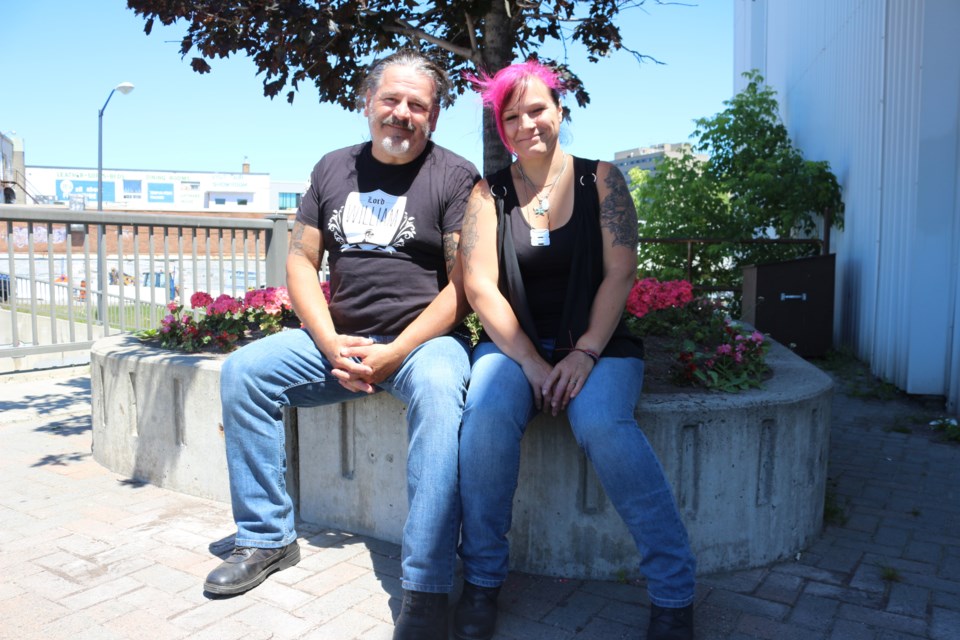Jenny Migneault is on a mission to educate and advocate for Canadian veterans and their families.
The Trois-Rivières resident made a stop in Sudbury on June 24 and 25 as part of her tour that spans from Northern Ontario to Manitoba and Saskatchewan. During her tour, Migneault will be speaking to the families of Canadian Forces veterans, and helping them better understand the realities of caring for someone suffering from PTSD.
Migneault is the spouse of a veteran living with PTSD and has been battling since 2014 to help military veterans and their families understand the challenges that they may face.
The challenges faced by caregivers are numerous, and Migneault says that the people charged with looking after their spouse or loved one who is suffering with the effects of PTSD are promised loads of support by the government, but the reality is that accessing those supports has become increasingly more difficult.
"Recently, the government introduced the Caregiver Recognition Benefit, but the list of criteria make it totally inaccessible for the caregivers who really need this measure," said Migneault.
"This was a political win at the time because for the first time caregivers were recognized and given $1,000 directly, where before, everything was done through the veteran and the caregivers had no identity. Once again though, full of promises but the people can't access this."
In addition to the difficulties faced with trying to access much-needed funds — many caregivers are forced to leave their jobs in order to care for their spouse — there is a disconnect in sharing of information when it comes to preparing the caregiver for life with a veteran affected by PTSD.
"We are uneducated and have very little support. We have very little knowledge of the military culture. For me, I was a civilian who married a veteran so I never knew my ex-husband while he was serving, I met him as a veteran and I became the collateral damage," said Migneault.
"How do you deal with paranoia? How do you deal with someone who is having nightmares all the time, a person who has experienced traumas we can't even imagine. Not to mention they have their own specific military culture that we are not familiar with. When they become a veteran they have to rehabilitate themselves and go through that time of trying to have a life where they can manage their symptoms and have financial security that allows them to have a quality of life and have a proper environment supporting you.
"Once they have come back, they can give back to society on so many levels."
Veteran pensions are another subject that Migneault has taken up issue with, and wounded veterans are taking as much as a 50-per-cent cut to their benefits if they became veterans later than 2006.
Those injured veterans who retired from service prior to 2006 are grandfathered into the old system where they receive a lifelong pension. Changes made to the pension by Stephen Harper's Conservatives in 2007 took away lifelong pension for injured veterans and replaced it with the New Veterans Charter, which includes a one-time, maximum $360,000 pay out.
The maximum lump sum a veteran can get under the New Veterans Charter is $360,000, but the average lump sum award is roughly $43,000.
Prior to 2006, veterans who were injured received a lifelong pension of a maximum of $2,733 per month tax-free as compensation for pain and suffering, based on the extent of their injuries.
During Justin Trudeau's campaign, he promised to reinstate lifelong pensions for injured veterans, but that line item has not been included in any of the three budgets the Liberals have passed.
Lifelong pensions could be re-instated by 2019, but early indications are that it will be at a significantly reduced rate of those prior to 2006.
Under the new plan, the lump-sum award will still be available to veterans who want the money right away, but they will now be able to choose a monthly payment for pain and suffering instead. The payment can reach a maximum of $1,150 per month.
Those with severe or permanent disabilities will also be eligible for a new benefit worth between $500 and $1,500 per month, on top of the pain and suffering award. Both benefits are tax free.
While small steps are being taken to support veterans, Migneault says the caregivers are still being left in the dark with little to no support from the government.
"If a veteran has to go to a doctor's appointment, he can call his neighbour to take him and that neighbour will be given $110 by the government, but me as the spouse, for doing the exact same thing, taking time off of work, I'm not given anything," said Migneault.
"We're not being recognized, I know people who have lost their jobs or had to quit because caring for a veteran is their primary focus."
Migneault is looking to deliver a message of hope and make personal contacts to build a strong support network among those who are going through the day-to-day struggles of caring for a veteran suffering the after effects of war.
"I'm trying to build a bridge between these communities and the governments and educate the population on the reality of what we are dealing with," said Migneault.
You can check out Jenny Migneault's stories from the road on her blog or to set up a meeting or speaking engagement you can reach her at [email protected].
